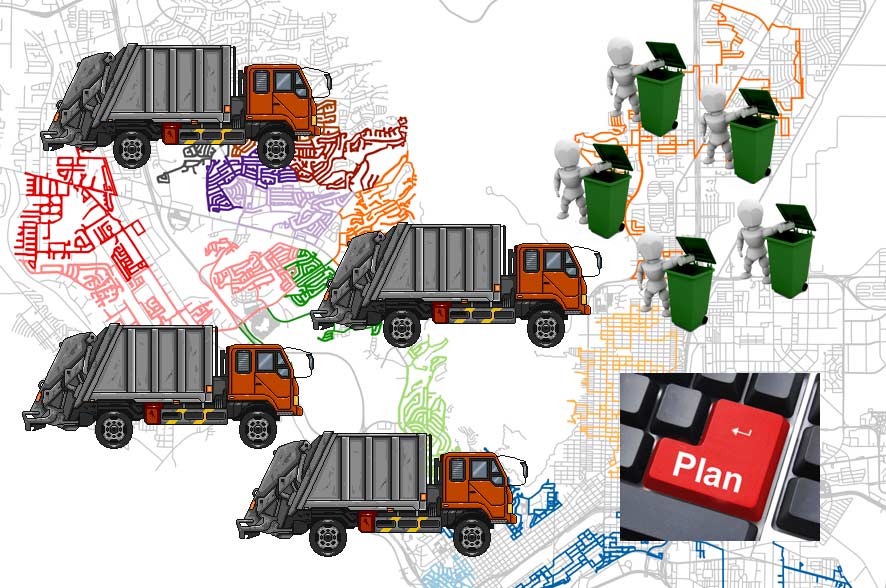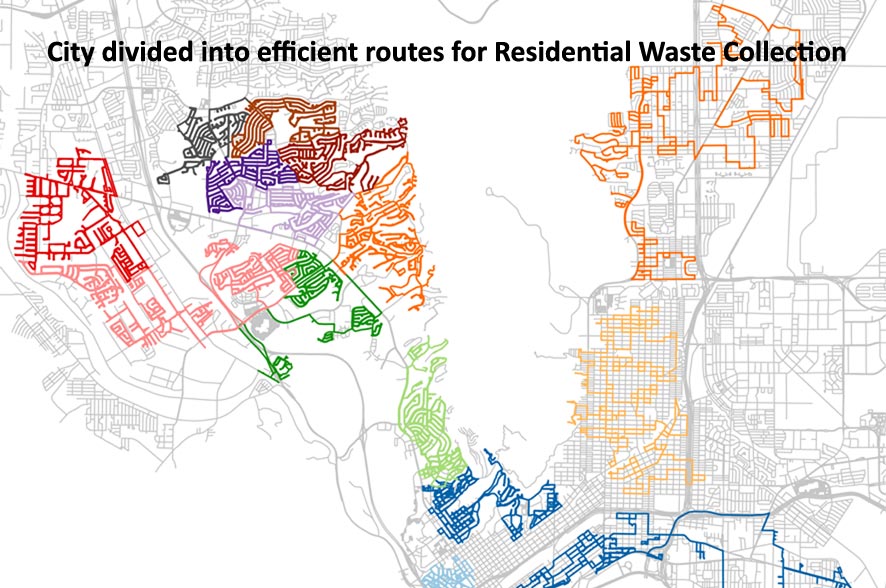Route Planning for Residential- and Industrial Waste Collection
Fixed frequency or collection on demand
Collection of waste can be route planned and optimized to minimize costs related to the waste collection. When designing efficient waste collection routes, it is natural to distinguish between the collection of residential waste from private households and industrial waste.
Residential waste collection is often carried out with fixed frequencies for emptying. Industrial waste, on the other hand, is characterized by having both tasks with fixed frequencies and time windows and tasks that occur only when a business asks for service. A route for industrial waste collection most likely have less locations to visit than a route for garbage collection from private households where all households in a city should be covered. Industrial waste collection can be further divided into scenarios where smaller containers or bins are emptied into the garbage truck or scenarios where a larger container is taken to the landfill and then either brought back to the original location or delivered to a new costumer at a new location.
Route planning for residential waste collection
A city has an area with 20,000 households who all need their garbage collected once a week. Both the city and the operator have a great interest in the optimized route plans and schedules that can ensure that the fleet of garbage trucks drive as few km and minutes as possible.
To make those route plans, Rapidis has developed a special edition of Logistics Planner called “High Density” that is capable of creating optimal routes for very large address volumes. In practice, the software divides the area into routes limited by the maximum working time allowed. Logistics Planner will also provide the best sequence for each route. Special requirements like disallowing left turns or curb approach are also handled by this edition of the route planning software.
Smart waste bins with sensors
Cities are increasingly adopting smart technologies and waste bins and containers are equipped with sensors that automatically reports how much capacity is left and if the bin should be emptied now, the next day or later. This leads to a very dynamic scenario and the pool of bins to be
emptied changes constantly. If a city, a municipality or an operator should benefit from this new information provided by sensors the benefit must arise from less costs and less environmental impact from collecting the garbage – and this is exactly the outcome of daily optimization of waste collection routes using Rapidis Logistics Planner.
Route planning for industrial waste collection
Bins and smaller container located at companies and institutions must be emptied on either fixed days or when the company calls for service. The software Rapidis offer to route plan such combinations of reoccurring tasks and new tasks will also make sure that vehicle capacities and time windows are not violated.
Route planning for special collections
Many municipalities and cities offer special collection of large waste items – sometimes for free and sometimes for a fee. Here all collection tasks are on demand and route planning can be complicated by the fact that different types of waste must be collected by different vehicles; functionalities that are part of the VRP version of Logistics Planner.
Route planning for construction waste containers
When handling full size containers for construction waste, modus of operation may be that a container is collected from one customer, then emptied at a landfill and finally returned to the either the same customer or delivered to a new customer. The many pickups, emptynings and deliveries can be route planned and optimized with Logitics Planner PD edition (Pickup and Delivery), for optimal routes, where the goal is to do the task with as few vehicles as possible and that these vehicles run as few minutes and km as possible.
Route planning for public waste bins
For every city, it is important that the city’s many waste bins will be emptied just at the right time so that the city’s users can get rid of their waste in a proper way. The VRP edition of Logistics Planner can provide the most optimal routes for emptying the city’s waste bins regardless of whether the emptying is to be done at fixed frequencies or if the bins are equipped with sensors reporting when emptying is required.
All editions of Rapidis Logistics Planner are available as extensions for ArcGIS as well as a cloud hosted web service (REST). The hosted services cover all European countries, USA, Canada, Australia and New Zealand. Other countries and areas can be added upon request.




